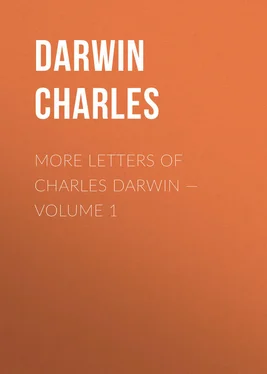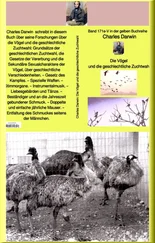Charles Darwin - More Letters of Charles Darwin — Volume 1
Здесь есть возможность читать онлайн «Charles Darwin - More Letters of Charles Darwin — Volume 1» — ознакомительный отрывок электронной книги совершенно бесплатно, а после прочтения отрывка купить полную версию. В некоторых случаях можно слушать аудио, скачать через торрент в формате fb2 и присутствует краткое содержание. Жанр: foreign_antique, foreign_prose, на английском языке. Описание произведения, (предисловие) а так же отзывы посетителей доступны на портале библиотеки ЛибКат.
- Название:More Letters of Charles Darwin — Volume 1
- Автор:
- Жанр:
- Год:неизвестен
- ISBN:нет данных
- Рейтинг книги:4 / 5. Голосов: 1
-
Избранное:Добавить в избранное
- Отзывы:
-
Ваша оценка:
- 80
- 1
- 2
- 3
- 4
- 5
More Letters of Charles Darwin — Volume 1: краткое содержание, описание и аннотация
Предлагаем к чтению аннотацию, описание, краткое содержание или предисловие (зависит от того, что написал сам автор книги «More Letters of Charles Darwin — Volume 1»). Если вы не нашли необходимую информацию о книге — напишите в комментариях, мы постараемся отыскать её.
More Letters of Charles Darwin — Volume 1 — читать онлайн ознакомительный отрывок
Ниже представлен текст книги, разбитый по страницам. Система сохранения места последней прочитанной страницы, позволяет с удобством читать онлайн бесплатно книгу «More Letters of Charles Darwin — Volume 1», без необходимости каждый раз заново искать на чём Вы остановились. Поставьте закладку, и сможете в любой момент перейти на страницу, на которой закончили чтение.
Интервал:
Закладка:
LETTER 28. TO J.S. HENSLOW. The Lodge, Malvern, May 6th, 1849.
Your kind note has been forwarded to me here. You will be surprised to hear that we all — children, servants, and all — have been here for nearly two months. All last autumn and winter my health grew worse and worse: incessant sickness, tremulous hands, and swimming head. I thought I was going the way of all flesh. Having heard of much success in some cases from the cold-water cure, I determined to give up all attempts to do anything and come here and put myself under Dr. Gully. It has answered to a considerable extent: my sickness much checked and considerable strength gained. Dr. G., moreover (and I hear he rarely speaks confidently), tells me he has little doubt but that he can cure me in the course of time — time, however, it will take. I have experienced enough to feel sure that the cold-water cure is a great and powerful agent and upsetter of all constitutional habits. Talking of habits, the cruel wretch has made me leave off snuff — that chief solace of life. We thank you most sincerely for your prompt and early invitation to Hitcham for the British Association for 1850 (28/1. The invitation was probably not for 1850, but for 1851, when the Association met at Ipswich.): if I am made well and strong, most gladly will I accept it; but as I have been hitherto, a drive every day of half a dozen miles would be more than I could stand with attending any of the sections. I intend going to Birmingham (28/2. The Association met at Birmingham in 1849.) if able; indeed, I am bound to attempt it, for I am honoured beyond all measure in being one of the Vice-Presidents. I am uncommonly glad you will be there; I fear, however, we shall not have any such charming trips as Nuneham and Dropmore. (28/3. In a letter to Hooker (October 12th, 1849) Darwin speaks of "that heavenly day at Dropmore." ("Life and Letters," I., page 379.)) We shall stay here till at least June 1st, perhaps till July 1st; and I shall have to go on with the aqueous treatment at home for several more months. One most singular effect of the treatment is that it induces in most people, and eminently in my case, the most complete stagnation of mind. I have ceased to think even of barnacles! I heard some time since from Hooker...How capitally he seems to have succeeded in all his enterprises! You must be very busy now. I happened to be thinking the other day over the Gamlingay trip to the Lilies of the Valley (28/4. The Lily of the Valley (Convallaria majalis) is recorded from Gamlingay by Professor Babington in his "Flora of Cambridgeshire," page 234. (London, 1860.)): ah, those were delightful days when one had no such organ as a stomach, only a mouth and the masticating appurtenances. I am very much surprised at what you say, that men are beginning to work in earnest {at} Botany. What a loss it will be for Natural History that you have ceased to reside all the year in Cambridge!
LETTER 29. TO J.F. ROYLE. Down, September 1st {184-?}.
I return you with very many thanks your valuable work. I am sure I have not lost any slip or disarranged the loose numbers. I have been interested by looking through the volumes, though I have not found quite so much as I had thought possible about the varieties of the Indian domestic animals and plants, and the attempts at introduction have been too recent for the effects (if any) of climate to have been developed. I have, however, been astonished and delighted at the evidence of the energetic attempts to do good by such numbers of people, and most of them evidently not personally interested in the result. Long may our rule flourish in India. I declare all the labour shown in these transactions is enough by itself to make one proud of one's countrymen...
LETTER 30. TO HUGH STRICKLAND.
(30/1. The first paragraph of this letter is published in the "Life and Letters," I., page 372, as part of a series of letters to Strickland, beginning at page 365, where a biographical note by Professor Newton is also given. Professor Newton wrote: "In 1841 he brought the subject of Natural History Nomenclature before the British Association, and prepared the code of rules for Zoological Nomenclature, now known by his name — the principles of which are very generally accepted." Mr. Darwin's reasons against appending the describer's name to that of the species are given in "Life and Letters," page 366. The present letter is of interest as giving additional details in regard to Darwin's difficulties.)
Down, February 10th {1849}.
I have again to thank you cordially for your letter. Your remarks shall fructify to some extent, and I will try to be more faithful to rigid virtue and priority; but as for calling Balanus "Lepas" (which I did not think of) I cannot do it, my pen won't write it — it is impossible. I have great hopes some of my difficulties will disappear, owing to wrong dates in Agassiz and to my having to run several genera into one; for I have as yet gone, in but few cases, to original sources. With respect to adopting my own notions in my Cirripedia book, I should not like to do so without I found others approved, and in some public way; nor indeed is it well adapted, as I can never recognise a species without I have the original specimen, which fortunately I have in many cases in the British Museum. Thus far I mean to adopt my notion, in never putting mihi or Darwin after my own species, and in the anatomical text giving no authors' names at all, as the systematic part will serve for those who want to know the history of the species as far as I can imperfectly work it out.
I have had a note from W. Thompson (30/2. Mr. Thompson is described in the preface to the Lepadidae as "the distinguished Natural Historian of Ireland.") this morning, and he tells me Ogleby has some scheme identical almost with mine. I feel pretty sure there is a growing general aversion to the appendage of author's name, except in cases where necessary. Now at this moment I have seen specimens ticketed with a specific name and no reference — such are hopelessly inconvenient; but I declare I would rather (as saving time) have a reference to some second systematic work than to the original author, for I have cases of this which hardly help me at all, for I know not where to look amongst endless periodical foreign papers. On the other hand, one can get hold of most systematic works and so follow up the scent, and a species does not long lie buried exclusively in a paper.
I thank you sincerely for your very kind offer of occasionally assisting me with your opinion, and I will not trespass much. I have a case, but {it is one} about which I am almost sure; and so to save you writing, if I conclude rightly, pray do not answer, and I shall understand silence as assent.
Olfers in 1814 made Lepas aurita Linn. into the genus Conchoderma; {Oken} in 1815 gave the name Branta to Lepas aurita and vittata, and by so doing he alters essentially Olfers' generic definition. Oken was right (as it turns out), and Lepas aurita and vittata must form together one genus. (30/3. In the "Monograph on the Cirripedia" (Lepadidae) the names used are Conchoderma aurita and virgata.) (I leave out of question a multitude of subsequent synonyms.) Now I suppose I must retain Conchoderma of Olfers. I cannot make out a precise rule in the "British Association Report" for this. When a genus is cut into two I see that the old name is retained for part and altered to it; so I suppose the definition may be enlarged to receive another species — though the cases are somewhat different. I should have had no doubt if Lepas aurita and vittata had been made into two genera, for then when run together the oldest of the two would have been retained. Certainly to put Conchoderma Olfers is not quite correct when applied to the two species, for such was not Olfers' definition and opinion. If I do not hear, I shall retain Conchoderma for the two species...
Читать дальшеИнтервал:
Закладка:
Похожие книги на «More Letters of Charles Darwin — Volume 1»
Представляем Вашему вниманию похожие книги на «More Letters of Charles Darwin — Volume 1» списком для выбора. Мы отобрали схожую по названию и смыслу литературу в надежде предоставить читателям больше вариантов отыскать новые, интересные, ещё непрочитанные произведения.
Обсуждение, отзывы о книге «More Letters of Charles Darwin — Volume 1» и просто собственные мнения читателей. Оставьте ваши комментарии, напишите, что Вы думаете о произведении, его смысле или главных героях. Укажите что конкретно понравилось, а что нет, и почему Вы так считаете.












